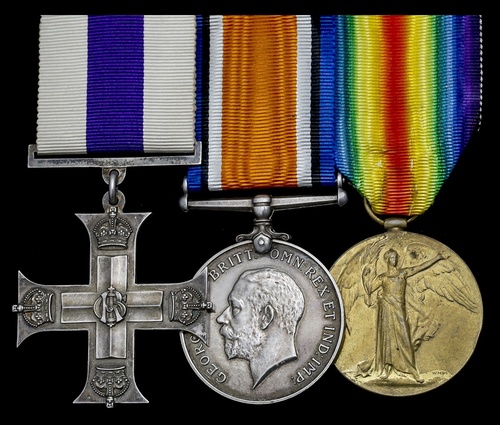
Auction: 17002 - Orders, Decorations and Medals
Lot: 365
'When it was known that he had been struck, it cast a gloom over the whole Battalion. He died a true soldier's death, a smile on his face and words of encouragement to his men.'
A letter of condolence from a fellow officer, refers.
A fine Great War 'trench raider's' M.C. group of three awarded to Captain B. Wilmot, 1st Tyneside Scottish, Northumberland Fusiliers, late Lincolnshire Regiment, who was killed 'by a sniper's bullet through the heart' in June 1917
Military Cross, G.V.R., unnamed as issued; British War and Victory Medals (Capt. B. Wilmot), one or two edge bruises, very fine and better (3)
M.C. London Gazette 25 November 1916:
'For conspicuous gallantry in action. He led a daring raid against the enemy's trenches, 30 to 40 of the enemy were killed and he himself accounted for two with his revolver.'
Ben Wilmot was born in 1896, the son of Joseph and Mabel Wilmot of Welholme Road, Grimsby, Lincolnshire.
Enlisting in the Lincolnshire Regiment (Territorial Force) in August 1914, he remained employed on the Home Establishment and was advanced to Sergeant. In the following year - in September - he was commissioned 2nd Lieutenant in the 20th Battalion (1st Tyneside Scottish), Northumberland Fusiliers, in which capacity he would have completed his training on Salisbury Plain in the closing months of 1915.
First Day of the Somme
Embarked for France in the new year, the 1st Tyneside Scottish took heavy casualties on the Somme on the 1 July 1916. Played into action by the Battalion's pipers, they went over the top at about 7.30 a.m., following the detonation of two great mines to the north and south of La Boiselle: the resultant craters will be well-known to visitors to the battlefield today.
With 500 yards of open ground to cover - in a wide expanse of killing ground known as Mash Valley - the ranks of the Battalion were decimated by enfilading machine-gun fire: 26 officers and 564 men were killed or wounded.
Trench raider
Wilmot may well have been among the latter but if so, he was fully recovered by October 1916, for he led a daring trench raid on the 12th. The relevant war diary entry speaks of a highly successful operation, Wilmot's bombing parties taking out a total of 12 dug-outs, 'some of which were occupied by Bosches. The estimated casualties in these dug-outs were between 30 and 40.'
The raiding party also took four prisoners but they attempted to escape and 'were consequently killed'. As per his M.C. citation, Wilmot personally accounted for two the enemy - soldiers of the 229th Prussian Reserve Regiment - with his revolver.
Sniper's bullet
Having survived further challenges in the interim, not least the opening days of the Arras offensive, he was killed by a sniper's bullet on 6 June 1917. A fellow officer - a 2nd Lieutenant - takes up the story:
'He was acting C.O. of our Company, No. 1 Company, in the recent advance against the enemy's trenches and after having gained the objective, and also after having done exceptionally fine work in consolidating the position, the enemy counter-attacked. He with the Company Sergeant-Major got out on to the top to get a better position to bomb the Bosche advance, and he had the satisfaction of seeing the enemy broken up and retreating in disorder when he received a sniper's bullet through the heart, death being instantaneous.
Your son was greatly loved by the men not only of his Company, but of the whole Battalion and his brother officers cannot speak too highly of him, for his fine work in the recent operations, his fine work to his men, and the carrying out of all work entrusted him, had endeared him to all. When it was known that he had been struck it cast a gloom over the whole Battalion. He died a true soldier's death, a smile on his face and words of encouragement to his men. His brother officers beg to join me with tendering our heartfelt sympathy to one who was so dear to all.'
His Commanding Officer added:
'I cannot tell you how deeply grieved I am to have lost such a splendid officer. Everyone in the Battalion held him in the greatest esteem and I can truly tell you that he was beloved by his platoon. He was always cheerful and full of courage which has been exemplified several times. He was a first-rate patrol leader and a day or two after the first great advance on 9 April I specially selected him for a special patrol. On this occasion he brought back news of the greatest value … '
Wilmot has no known grave and is commemorated on the Arras Memorial; sold with copied research.
Subject to 20% VAT on Buyer’s Premium. For more information please view Terms and Conditions for Buyers.
Sold for
£1,100




